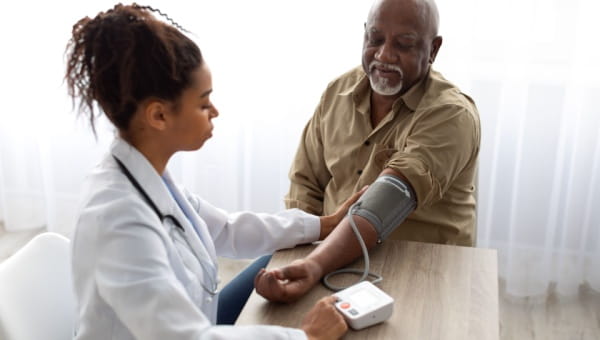About Heart Failure
Heart failure (HF) is a condition that happens when the heart can no longer pump as it should to provide enough blood to give the body needed oxygen and nutrients. Heart failure can develop when something has damaged or weakened the heart muscle, or when the heart cannot pump or fill with blood correctly. While heart failure often occurs in older adults, it can occur at any age. Heart failure is sometimes referred to as congestive heart failure.
Heart failure has four different stages:
- Stage A - Those who are at risk of developing heart failure but do not have any signs of it.
- Stage B - Those who have signs of or problems with their heart’s structure, even though they may not have any symptoms.
- Stage C - Those who have signs and symptoms of heart failure.
- Stage D - Those who have signs and symptoms that interfere with or impact their daily lives. This stage is often called advanced heart failure or end stage heart failure and can lead to repeated hospitalizations.
After a stage diagnosis, your doctor or heart failure team will use the New York Heart Association (NYHA) Functional Classification system below to understand the impact of your symptoms. The higher the heart failure stage and NYHA class gets, the more severe the heart failure condition is for that individual. To learn more, visit the American Heart Association.
NYHA Functional Classification System
-
Class I
-
Class II
-
Class III
-
Class IV
Symptoms of Heart Failure
When the heart isn’t pumping blood as well as it should be, blood often backs up in the lungs and other parts of the body, causing shortness of breath and swelling in the feet, ankles and legs. Other common signs and symptoms of heart failure include:
- Shortness of breath or trouble breathing with exertion
- A weight gain of 2 to 3 pounds in one day or weight gain of 5 pounds or more in one week (due to fluid retention)
- Swelling of the stomach area sometimes with nausea or decreased appetite
- Feeling tired, no energy
- Dry, hacking cough
- Dizziness or lightheadedness
- Shortness of breath when lying down
- Waking up at night suddenly feeling breathless or having a dry, hacking cough
- Feeling uneasy, you know something is not right
If you have a sudden onset of symptoms such as chest pain, chest pressure, chest tightness, or severe shortness of breath, you may be experiencing a medical emergency. Call 911 immediately.
Causes and Risk Factors
Heart failure is often caused by damage to or weakening of the heart muscle. Sometimes the heart may get bigger and become enlarged. Many different things can damage or weaken the heart, such as heart attacks, different viruses, drug or alcohol use, genetic causes (family history), and some medications used to treat other conditions. The most common risk factors for heart failure include:
- High blood pressure
- Coronary artery disease
- Diabetes
- Heart attack
- Abnormal or poorly functioning heart valves
- Sleep apnea
- Heart rhythm disorders
- Smoking
- Being obese or overweight
- Alcohol or drug abuse
- Certain types of radiation and chemotherapy
-
BNP Testing
-
Chest X-Ray
-
Echocardiogram
-
Electrocardiogram
-
MUGA Scan
-
Nuclear Stress Test
-
Stress Test
-
Cardiac MRI or CT scan
This non-invasive test shows the size and shape of the heart and lungs. Chest x-rays can be scheduled with a BayCare Imaging Center.
Also referred to as an ECG or EKG, these non-invasive tests measure the heart's electrical activity and helps to show any heart rhythm (arrhythmias) issues and/or heart muscle damage via a tracing made of the heart. ECG or EKG testing is often performed in your cardiologist’s office.
A multigated acquisition (MUGA) scan is a special nuclear medicine imaging study using a small amount of radiotracer to determine your heart’s ejection fraction and see how well the heart pumps blood. Ejection fraction tells your doctor how much blood your heart pumps out when it squeezes. MUGA scans can be performed at some physician offices and at the following BayCare facilities as an outpatient imaging procedure by calling (855) 259-4333:
- Bartow Regional Medical Center
- Mease Countryside Hospital
- Mease Dunedin Hospital
- Morton Plant Hospital
- Morton Plant North Bay Hospital
- South Florida Baptist Hospital
- St. Anthony's Hospital
- St. Joseph's Hospital
- St. Joseph's Hospital-North
- Winter Haven Hospital
Outpatient Imaging Centers:
This version of a stress test involves the elements of a regular stress test but adds taking special images of the heart. A nuclear tracer is given through an IV and a special camera takes images of the heart as the tracer moves through it before and after exercise is completed. Nuclear stress tests can be performed by the following BayCare hospitals:
A stress test is used to see how your heart reacts when it’s having to pump faster. This test is performed by having you walk or jog on a treadmill or use other exercise equipment that elevates your heart rate. During this test, you wear a device that shows your heart’s activity while it’s under pressure. Stress tests can be performed at the following BayCare hospitals:
These are non-invasive tests that show detailed images of the heart’s chambers, valve and muscles. MRI uses radio waves and magnets while a CT scan uses x-ray beams to create the images of your heart and its arteries. MRI or CT scans can be scheduled with a BayCare Imaging Center.
Treatment Options
If you or a loved one has been diagnosed with heart failure, it’s important to be well informed about the stage and symptom class of the diagnosis. This helps you take an active role in treatment decision making with your care team.
While there is no cure for heart failure, it can be managed to help people live longer, fuller lives with less symptoms. Treatment options vary based on the stage and the severity of symptoms and can include:
-
Lifestyle Changes
-
Medications and Drugs
-
Internal Cardiac Defibrillators (ICDs)
-
Other Implantable Devices
-
Surgery
-
Heart Transplantation
- Reduce sodium (salt), fat and cholesterol.
- Take your medications to help improve heart function.
- Rest, relax and manage your emotions.
- Be active and exercise (with guidance from your cardiologist).
- Track your weight daily so you can see early changes. Weight gain can mean you’re retaining water and might be telling that you are going to be sicker and admitted to the hospital.
- Monitoring your blood pressure and heart rate:
- While everyone has slightly different goals based on age and health conditions, consult with your doctor if your blood pressure is consistently over 140/80 or less than 90/50.
- Other lifestyle changes such as good nutrition, quitting smoking and avoiding alcohol.
Medications are often the first medical step in treating heart failure and are recommended or prescribed based on your specific stage and symptoms. Medications are typically managed by your cardiologist or advanced heart failure specialist. BayCare’s Heart Function Clinics can also help those with heart failure manage symptoms and medications. Common medications and drugs used to treat heart failure include but are not limited to:
- Angiotensin-converting enzyme (ACE) inhibitors and angiotensin receptor plus neprilysin inhibitors (ARNIs): These medications block harmful chemicals the body makes in response to the low heart function and make the heart more efficient. Mineralocorticoid antagonists also help reduce the effect of harmful chemicals made by the body and helps the heart from enlarging.
- Angiotensin-II receptor blockers (ARBs): These drugs block the protein angiotensin II, preventing it from narrowing the blood vessels.
- Beta blockers: These drugs lower blood pressure and strain on the heart in different ways including improving the health of the cells that make up the heart.
- Diuretics: These medications can help you remove extra water from your body. They do not improve survival but are helpful for controlling symptoms of heart failure like swelling in the legs or fluid in the lungs.
- Mineralocorticoid receptor antagonists (MRAs): Also called aldosterone antagonists or aldosterone receptor antagonists, these drugs help the kidneys remove more water and salt by blocking the use of aldosterone, a hormone made by the body. Sometimes called potassium-sparing diuretics, MRAs also help reduce the effect of harmful chemicals made by the body and help keep the heart from enlarging.
- Sodium-glucose cotransporter 2 (SGLT2) inhibitors: These are medications traditionally used to treat diabetes by preventing the absorption of glucose (sugar) in the kidneys. In heart failure patients, recent clinical studies have discovered the benefits of combining SGLT2s with beta blockers, ACEi/ARB/ARNI, and MRAs, for heart failure patients to improve symptoms and reduce the risk of hospitalization and death.
ICDs are devices that can monitor the heart for dangerous rhythms and pace or send a shock to help correct them. ICDs can also shock the heart if it suddenly stops beating (sudden cardiac arrest). ICDs can be placed by our electrophysiology cardiologists at these locations:
- Baroreceptor therapy (Barostim): An implanted device that targets the baroreceptors in your neck to help regulate the heart’s function and improve its ability to pump more efficiently. These devices are implanted at:
- Cardiac contractility modulation (CCM) therapy: A new approach using an implanted device that sends specifically measured electrical impulses to the heart’s right ventricle to improve its ability to pump. These devices are implanted at:
- Left ventricular assist devices (LVADs): LVADs are implanted heart pumps that work alongside the heart to help pump blood and may be an option for advanced heart failure patients. LVADs can be temporary devices used while someone waits for a heart transplant or be a final therapy for someone not able to receive a heart transplant.
- BayCare’s mechanical circulatory support program (LVAD) is located on the campus of St. Joseph’s Hospital in Tampa.
Surgery to treat underlying causes such as valve disease or rhythm disorders can improve the heart’s function and lessen the severity of symptoms. BayCare’s outstanding cardiovascular open-heart surgery programs are located at:
Living With Heart Failure
Living with heart failure can be scary, but with the right care and managing symptoms, many people can live a normal life. It’s important to work closely with your heart health care team such as your cardiologist and advanced heart failure specialist to develop a treatment plan that’s customized for your specific needs, goals, and wishes. Treatment plans can relieve some of your symptoms as well as improve quality of life and make you more comfortable. Below are some tips to help you actively work with your care team:
- Have your care team’s contact information handy and know when to reach out for help between your regular appointments. Never hesitate to contact your care team.
- Keep a list of any questions or symptoms you may have to address with your care team.
- Use the handy tools that your care team may provide such as a daily calendar, medication reminders, etc.
-
Are there special heart doctors that focus on treating heart failure or advanced heart failure?Advanced heart failure specialists are cardiologists with additional focused training in heart failure management beyond residency and fellowship training in cardiovascular disease. They focus on optimizing care for heart failure patients to improve their quality of life and help them live longer. Advanced heart failure specialists often work alongside a general cardiologist to create the best individualized long-term treatment plan for heart failure patients.
-
When should I see an advanced heart failure specialist?It is recommended to see an advanced heart failure specialist in addition to your cardiologist when you have: Symptoms such as shortness of breath or swelling of legs or stomach known as edema even while on medications like diuretics.
- Symptoms affect your physical abilities with activity or daily life
- More than one hospitalization in 12 months
- Liver or kidney disease due to heart failure
- Left ventricular ejection fraction (LVEF/EF) is under 25%. This refers to how well your heart pumps blood and in a healthy heart, this is usually 50-70%.
- Medication management needs such as:
- Having to reduce medications for heart failure due to lower blood pressures
- Use of high dose of diuretic including lasix or furosemide (for example: 80mg twice daily)
- Need for IV or oral medications for support of the heart or blood pressure. These may include dobutamine, milrinone or midodrine.
- If you would like a referral to an advanced heart failure specialist, fill out our referral form and select “other.
-
When should I call my doctor if I have concerns?
Consult your doctor and care team, but it is generally recommended to reach out to them if you experience any of the following:
- A weight gain of 2 pounds in one day or 5 pounds or more in one week
- More shortness of breath or trouble breathing
- More swelling of your feet, ankles, legs or stomach
- Feeling more tired, no energy
- Dry, hacking cough
- Dizziness
- Feeling uneasy or knowing something isn’t right
- It’s harder for you to breathe when lying down or you need to sleep sitting up in a chair
- Sudden coughing fits or shortness of breath while sleeping
-
How long can I live with this disease?Heart failure is a serious condition and a leading cause of death, hospitalization, and poor quality of life in the United States. Though it has no cure, it’s possible to live a longer, fulfilling life IF the condition is well managed. It’s important to discuss your specific case with your cardiologist or heart failure team. Working together to maximize your lifestyle changes, optimize medications, and use devices aggressively can make a big difference in longevity and quality of life.
-
How often should I consult my doctor on different things I want to do like driving, exercise, or travel?Working closely with your heart failure team or cardiologist is a very important part of managing your condition. Be sure to discuss any changes you’d like to make to your lifestyle, diet, etc. with your care team to determine what impact it might have on your condition and what to watch out for and have a plan in place on when you need to see your doctor if your conditions or symptoms change.
-
Are there any clinical trials that I might benefit from?Given the seriousness of heart failure and the 50% chance of death at 5 years of diagnosis, cardiologists and advanced heart failure cardiologists often look to clinical trials to help patients. All currently used remedies for heart failure started as a clinical trial. Clinical trial participation is an option and your choice. Talking to your cardiologist or advanced heart failure care team is the best place to start a conversation about the potential benefits of trial participation. Click here to learn more about research and clinical trials at BayCare.
Find a Location
BayCare has four heart function clinics across West Central Florida that specialize in evaluation, medical management and treatment of patients with heart failure and the conditions that cause it.
BayCare Heart Function Clinic at Morton Plant Hospital
Cheek-Powell Heart and Vascular Pavilion455 Pinellas St., Suite 250 Clearwater
(727) 462-3701
Comprehensive Advanced Heart Failure Center
The Medical Arts Building at St. Joseph's Hospital
3003 W. Dr. Martin Luther King Jr. Blvd., Tampa
(813) 397-1251
Chest Pain Heart Function Clinic at St. Anthony’s Hospital
1200 Seventh Ave. N., St. Petersburg
(727) 820-7904
BayCare Heart Function Clinic at Winter Haven Hospital
200 Ave. F N.E., Winter Haven
(863) 292-4127
For those that may wish to be evaluated for treatment of “late-stage” or advanced heart failure, BayCare’s Mechanical Circulatory Support Program evaluates patients for LVADs and heart transplantation. The Program is located on campus at St. Joseph’s Hospital in Tampa.
Need a referral to an Advanced Heart Failure Specialist?
Call us at (855) 233-0888 or fill out the form and select “other”.




